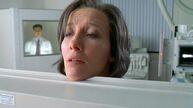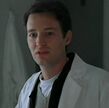The movie mainly shows the protagonist Vivian Bearing's inability to the tumor itself and the medical team after being diagnosed with the terminal stage of cancer. The movie portrays most of the medical staff, especially Dr. Kelekian (Vivian's attending physician) and Jason (Vivian's former student, and now a hospitalized doctor) as extremely clever, but lacking in humanistic care.
Dr. Kelekian's dress is black and white, and Vivian is regarded as a research object from beginning to end. Jason doesn't care about Vivian excessively, but Vivian understands that he is a young man who is very interested in tumor research. In front of Vivian, a cancer patient, Jason used an excited tone to describe how fascinating tumor cells are. There was a scene where Vivian was suffering. Jason wore a gray sweater and showed a tangled state of mind for the first time, as if he wanted to be comforted, but finally turned around and left. Even knowing that Vivian had signed the DNR in the end, code blue was forced to try to rescue him, only to show a trace of guilt after being stopped by the nurse Susie.
The movie portrays most medical staff negatively. It seems that only nurse Susie has sympathy for Vivian, willing to listen, willing to share information, and willing to suggest adjustments to the treatment plan from her perspective, although she is still powerless in the face of the doctor's final decision. This is not the general outlook of medical staff, but what this extreme form of portrayal tries to convey is: the spiritual world of the patient, what we should not do, in other words what we should do.
1. As a cancer patient, how was Vivian gradually de-humanized?
a. Lost real care (no one cares whether she is good or not, just rushing to finish the work in a hurry)
b. Lost her true identity (no one cares about her occupation, background, experience, just one of the patients) ("Name?" "-Vivian Bearing." "Doctor?" "-Oh yes, I am a doctor. " “I mean, who is your doctor?”)
c. Loss of autonomous control, system takes over
d. Loss of privacy (medical staff play with the patient’s body without questioning)
2. Dr. Kelekian, as the chief physician of the protagonist Vivian Bearing, is telling What is wrong with the diagnosis result? In other words, what should we do as medical workers (now or in the future).
a. Give the patient sufficient time to digest the diagnosis results and discuss with friends and family members.
b. Avoid using a lot of medical terminology (Vivian is a PhD and a professor of English literature at the university. He is excellent in the academic field and still cannot understand a large number of medical terms. The general reading level of patients may be in junior high school or below, and they may not even know hypertension = high blood pressure, do not understand the concept of fasting.)
c. Discuss with the patient to determine the purpose of treatment: prolong life vs. improve quality of life (quantity vs quality.) (Generally speaking, the more promising the treatment, the more aggressive the treatment; , The more inclined to palliative, that is, to improve pain and symptoms)
d. Fully discuss the options of treatment with the patient to ensure that the final choice is beneficial to the patient, not to us or to scientific research (drugs, surgery, aggressiveness)
e. Ensure that the information of both parties is equal
f. Adequate patient education (treatment course, side effects)
g. Sympathy
3. What is the difference between "Interview" and "question" patients, and what should we do when asking for a doctor?
a. Keep your sight at the same level (if possible, pull a chair and sit by the bed instead of letting the patient look up at you)
b. Keep eye contact, not just busy filling out forms
c. Listen carefully to the patient’s experience What do you feel, instead of just getting the information requested on the form
d. Ask open-ended questions when possible
3. Watching an independent and wise woman gradually lose control of her life and life due to pain While struggling, crying and fearing, few people are willing to comfort and listen. In the end, Vivian almost lost all consciousness. Her professor when she was young went to the ward to visit, read her fairy tale "The Runaway Bunny", and said softly "Time to go" (Why might some people feel as though they need permission to die? Because Death is not even a matter of one person.)…………………………I dare not look up at all! After watching the movie, you don’t need to remove your makeup at night! And looking around the classroom, I seem to be alone? !
There were eleven discussions in the class, and it was almost a film appreciation class. What is the ironic meaning of John Donne's poems? What does the recurring painting of Saint Sebastian want to express? Not for the time being.
At the end of the movie, Vivian and Susie explained the meaning of soporific and told her "I am a teacher", which is considered to be returning her precious identity.
Take-home message:
-Always get patients involved
-Look at their face, look into their eyes , not just where the tumor is
-Treat them as a person, not just as one of your patients or even as a research subject. When I tried
two years ago, I was asked what is the most important characteristic of being a member of the medical team in the future. I said I dare not say empathy At least you must keep sympathy. I know that sympathy is easy to be worn away in a real work environment. In the emergency department, I encountered a fall and a cerebral hemorrhage, a serious bruise on the corner of the eye and a severe bruise on the head, alone and almost completely deaf. Because of the effects of painkillers, I have to sleep for a few minutes every time I answer a question, and wake up the patients who finally told me get out several times. I seem to be most worried about not being able to complete my part of the work on time.
I still want to remember my original intention in ten or twenty years, and forty-five years later.
View more about Wit reviews











